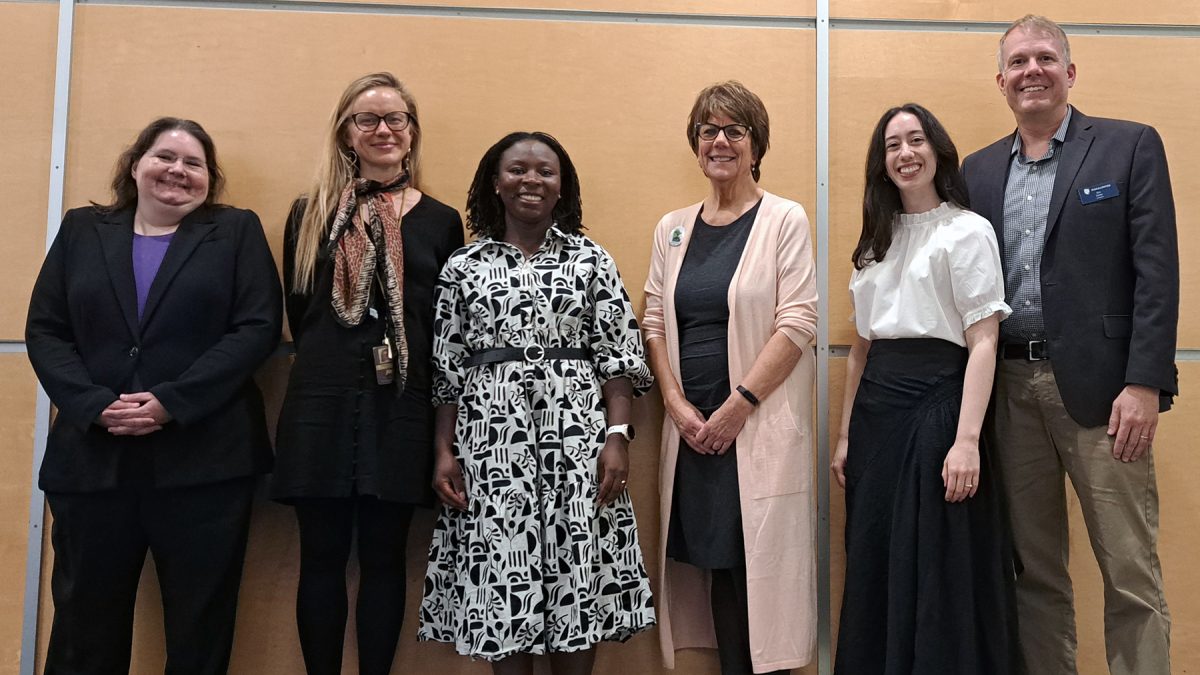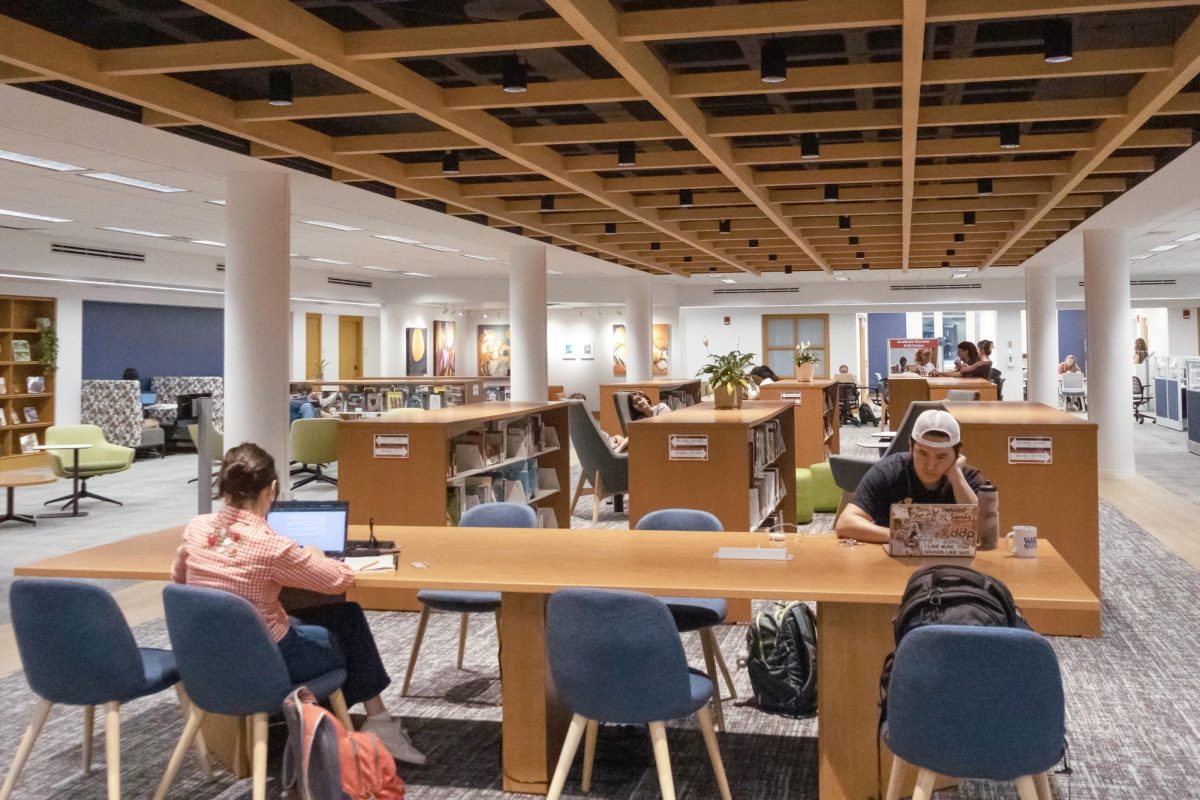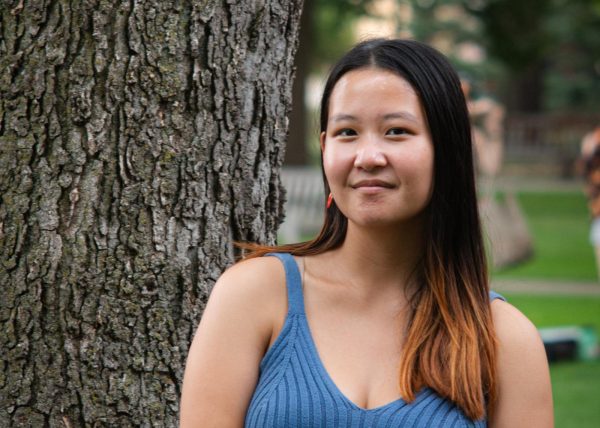This Thursday, Sept. 28, professors Eric Carter and Vanessa Voller hosted a panel discussion in Alexander G. Hill Kagin Ballroom featuring a variety of healthcare professionals to discuss health equity in Minnesota.
The talk, sponsored by the Racial Justice Project Fund under Institutional Equity, has been a long time in the making and is a subject near and dear to the hearts of the hosts. Dean of Institutional Equity Alina Wong began the event, introducing Carter to audience members both in Kagin Ballroom and on Zoom.
Wong made a few announcements, including the recent bestowing of the title of Edens Professor of Geography upon Carter, who also holds the role of Co-Director of the Community & Global Health Concentration at Macalester. She further discussed how Minnesota has often been noted to be one of the “healthiest” states within the U.S., but has stark disparities in health outcomes by race and class.
Carter then went on to introduce the four panelists invited to share their experiences that night. The panelists included Gina Debogovich, Dr. J’Mag Karbeah, Rose Roach and Macalester alum Miranda Harris Martinez ’18, a notably all-female lineup.
The panelists came from a variety of backgrounds within the public health sector. Debogovich boasts several years leading UnitedHealth Group’s LGBTQ+ Health Equity Council and implementing a continuing medical education program to help providers create more welcoming spaces for LGBTQ+ patients. Dr. Karbeah is a researcher at the University of Minnesota, where her expertise focuses around how structural racism impacts maternal and child health outcomes. Roach is the former Executive Director of the Minnesota Nurses Association, along with serving on several task forces working on topics such as healthcare financing and lowering pharmaceutical costs. Martinez is a third-year medical student, and leads the committee advisory board for Aquí Para Tí, which is a clinic based program that strives to serve Minnesota Latine adolescents in culturally informed ways.
Panel co-host and Macalester International Studies Professor Vanessa Voller, who is a PhD candidate at the University of Minnesota, started off the questioning by asking what she termed a deceptively simple question: “What does health equity mean to you?”
Roach began the responses with a preface, stating that she speaks about health equity from a systemic, rather than programmatic viewpoint.
“Equity is when everyone, no exceptions, has what they need—resources and opportunities for an equal outcome to others in society,” Roach said. “Equity is when everyone has equal access to a single standard of care without financial or administrative barriers. In other words, everyone gets the care they need when they need it, not just when they can afford it.”
Karbeah echoed this sentiment, adding that health equity is about commitment to social justice. At its core, she said, we have a social system based around some people having power and access to resources while others do not.
Martinez, who sees patients on a day-to-day basis, emphasized the importance of patients being able to relate to their healthcare providers and feel represented, both linguistically and culturally, by the physician they see in front of them.
“[Health equity] means that the patient that comes to my door has decided their health for themselves, and it hasn’t been decided for them by their zip code,” she said.
Voller followed up the opener with another thoughtfully-worded question, asking the panelists to discuss the myths and misconceptions about health equity that they encounter most often in their field.
Martinez expressed concern that, especially in her experience in medical school, health equity is viewed as a concept that is separate from medicine, rather than integral. She cited that she has had only two classes focusing on structural inequities during her three years in medical school, despite the influence that social, political and economic factors play in health.
Similarly to Martinez, but from a funding and business perspective, Debogovich agreed that there is an idea that health equity is something you specialize in, that is done by a specific team on a specific floor of an office building.
“I think one of the things we really need to break through is [to] understand that all of us have the ability to be the communicator, to be the instigator,” she said, acknowledging the tendency people have to pass off work they are not experienced in to others.
Roach addressed a lot of the biases and systemic issues that are inherently built into the healthcare system, stating that in the history of American healthcare, we have had centuries of medical neglect and abuse of POC and Black bodies.
“The belief that my health and well-being can exist in the absence of the health and well-being of others — that is a myth,” she said. “The most ill conceived notion about health equity is that it can be significantly improved by anything other than removing financial barriers to healthcare. We’re paying for a public health care system, we’re just not getting one. And it’s time to change that.”
The next question posed by Voller consisted of two parts, concerning how the U.S. spends the most money on healthcare out of the “industrialized world,” yet has some of the worst health outcomes comparatively.
“How do we reconcile these two facts?” she asked. “What do you believe lies at the root of these health disparities?”
Dr. Karbeah raised an important issue heavily involved in her research: how to address a lack of data in certain populations because there is a severe lack of trust in science and the medical community. This issue is largely due to historical marginalization and the way in which we have built our knowledge base and medical policy.
“The problem is that we’re told there’s not enough people to think concretely about what their healthcare problems are,” she said. “We’ve created a system [that] in a multitude of ways, including our data, allows us to ignore the experiences of marginalized people.”
Debogovich reaffirmed Karbeah’s words, citing calls she heard during her time at UnitedHealth Group where people would call receptionists for healthcare providers to schedule an appointment, only for the receptionist to turn them away, saying things like “we don’t treat those people here.”
“You have individuals who are being denied access to care, if they can even afford it, and that translates into billions of dollars of delayed care, across all marginalized groups,” Debogovich said. “We don’t have a good relationship with our healthcare system, because our healthcare system is failing us.”
Roach next reminded attendees, that Minnesota is an overwhelmingly white, middle class state where most of the population resides in urban areas, attributing the health disparities to how healthcare resources are allocated.
“That lack of access to care is very much driven by huge healthcare corporations who are the ones making decisions about where to open or close healthcare facilities based on their bottom line, not on the community’s health needs,” she said. “These decisions are based on business strategies, not healthcare strategies.”
Transitioning to a more uplifting note, Voller asked about strategies for promoting healthcare in Minnesota, and how students can help contribute to dismantling the system set in place.
Martinez answered enthusiastically, referencing her experience in clinical work. She said that when providers actually speak and listen to community members, their messages are clear. Doing so also allows providers to better tailor healthcare services to the patients’ needs, and includes care beyond just physicians, such as mental health therapists, nutritionists, a community health worker and a parent coach.
Debogovich wholeheartedly agreed with this concept, citing a project she worked on educating medical providers on LGBTQ+ terminology and mental health issues to create a more welcoming environment.
“We created that training series, which did provide continuing education credits for our providers, and we actually released it to the world for free, which you don’t often hear from a for-profit company,” Debogovich said.
Karbeah raised the point that analyses about the productivity of the healthcare system cannot be truly accurate when analysts are not working with the full scope of expenditure data.
“We’re not really collecting data that tells us … what strengths are in these communities that we can better leverage,” she said. “How do we collect data in a way that focuses on organizations that are already doing the work in our community versus continually giving tax dollars to folks who are really just telling us how bad it is?”
Following up, Voller asked next about how dissatisfaction regarding the healthcare system comes from all sides, from doctors to nurses to patients. Despite this frustration, political change is still not happening, she said, opening the conversation to discussion about forming political coalitions to strategize moving forward.
“At its core, especially when we think about health equity, it’s about patient safety,” Karbeah said. “It’s having people who understand the need for interdisciplinary intersectoral approaches … and really leverage the talents the community has to offer.”
Roach suggested that health equity is about intersectionality across the social justice movement and that when considering the fight for dismantling racist and anti-immigration structures, health intersects all of us.
“I was in the labor movement for 34 years, and all we would do is yell at each other across the table about who was going to pick up the cost of this really, really expensive system, we never realized that we had a common enemy,” Roach said. “It was the system itself. It is about having those simple one-on-one conversations.”
Debogovich also highlighted the importance of one-on-one conversations when it comes to making personal connections. Together you build that connection into an alliance and sometimes it’s about changes, and sometimes about tugging on someone’s heartstrings.
“These things are all gonna take [be] long term,” she said. “That’s why corporate America is not funding most of this. It’s making very, very personal connections, making that individual see the vision and making them feel like a part of helping change something for the better.”
Martinez brought up the concept of hospital mergers, and referenced the recent proposal to merge the University of Minnesota’s health system with Sanford Health, a non-profit rural healthcare system headquartered in Fargo, N.D. Mergers, she said, historically increase prices for patients and cause shutdowns of rural clinics and hospitals. The University of Minnesota professors’ union got involved in action against this merger because the entire university was implicated. Like Martinez herself, they felt inexperienced in organizing, and looked to organizers with more experience and connections, such as Roach, for guidance.
“I think it’s ok to ask questions when it comes to coalition building and also be transparent about what you don’t know,” she said. “In coalition building, people are so willing to share their knowledge and resources and that’s how we made it.”
Following the panel discussion, Voller and Carter opened the discussion up to the audience for a brief Q & A period. The first question covered the financial barriers to healthcare, specifically the influences of the health insurance system and any potential reforms for accessibility there.
“Health insurance is completely superfluous to this system, we don’t need it,” Roach said, starting off the responses with strong words. “It’s a middleman that is absolutely taking precious healthcare dollars and turning it into dividends, high paid compensation packages for CEOs who never heal anybody.”
Karbeah has also found that health care expenditures are coming from administrative burdens, estimating that number at about 14%.
“[We are] coding, billing, setting up infrastructure for things that we don’t really need, but have been telling ourselves we need for the past 50, 60 years, but other countries ‘happen’ to administer healthcare at a higher quality without these systems,” she said.
The next question came from Macalester professor Ron Barrett, a medical anthropologist and former nurse. He posited the question of the billion dollar pitch, asking panelists what they would say to a person who disagrees with them politically and has some power to convince them of the need to achieve health equity.
Debogovich joked that if she had the answer to that question, she would have done it during her time at UnitedHealth, but that she stands by the head, hands and heart approach.
“We all do better when we all do better .. especially when we’re thinking about the divisions that exist and the tensions that come up,” Karbeah said. “I think fundamentally the fear is that [other] people will get things that I don’t get.”
Meanwhile, Martinez cited a quote from one of the youth community members she works with through Aquí Para Tí, who asked ‘What if all clinics were just like my local supermarket?
“When I walk in there, the smells, the language I hear, I just feel safe, I feel at home, and I know I’m going to get what I need,” Martinez quoted. “And that’s what she wants out of her healthcare.”
The panelists next fielded some questions from Zoom audience members regarding how a public, non-profit healthcare system would help underserved communities acquire access and how the educational system can help to prepare students to be better public health professionals.
Themes from earlier in the night resurfaced, such as how corporations run on a three month calendar that does not allow for long-term consideration or progress, and how health equity is considered a specialty, rather than something that all those working in healthcare fields should be educated on and consider.
Ending on a high note, each of the panelists spoke briefly about what gives them hope for the future of health equity.
“Having this conversation,” Debogovich said.
“Monumental health policy successes in the last few years,” Roach volunteered, citing recent changes to reduce and standardize insulin costs.
“[Those] most negatively impacted by this system … not being willing to accept the status quo anymore,” Karbeah said.
“Community voices give me hope,” Martinez concluded.












